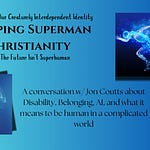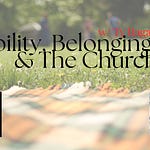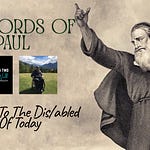It was several years ago when I sat in a cozy living room along with several other students as we listened to Dr. Richard Beck explore our ideas and thoughts behind hospitality and the Church. At some point, Beck turned to me as the sole leader in the room who led a House Church movement and asked, “How do you discern and respond to heresy in your church?” At the time, I wasn’t quite prepared for the question as I fumbled through the best answer I could give in that moment.
That experience seems to have always remained in my memories as I recall it often, including when I heard an answer to the same question brought to Dr. Joerg Rieger in a class I recently was taking part in online. Building upon a theological truth that religion can be found in all things — traditions, economics, family life, politics, social systems, etc. — Rieger says the definition of heresy can be articulated both to the individual and the community through the explorative balance between two questions:
What brings life into the world?
What puts death into the world?
Is this answer problematic because the definition of heresy lies within two subjective inquisitions? Maybe. But historically, when the definition of heresy’s meaning has been kept within an institutional objectivity, it has often led into oppressive prejudicial corruption and harmful injustices. Perhaps the meaning of heresy was always meant to be kept within a human relationally organic and subjectivity to the pursuit of justice and creational well being. Now that truly is a mouthful!
To maybe try and bring some practicality in working out heresy and the pursuit of just meaning in our lives, God instilled a sense of the prophetic into each of us (Eph. 4:11 — APEST). In a sense, everyone has a prophetic imagination to grow in tune with and shape the world around them.
Unlike the false assumption that prophecy is about foretelling the future, a proper understanding to the prophetic imagination as articulated by Walter Brueggemann is that it is meant to “nurture, nourish, and evoke a consciousness and perception alternative to the consciousness and perception of the dominant culture around us.” In a simpler expression shared by Krista Tippett:
“[The prophetic imagination] helps us connect the dots between the world as it is and the world as it might be. It also tends to emerge in moments of chaos and change.”1
What are some practical ways we then can learn and grow with our prophetic imaginations?
To start, perhaps we can begin to allow it to weave a visualization and articulation of God’s, or the Divine’s desire for our reality. In a deeper sense within ourselves, we can envision a world that is significantly better then the one we are in. This imagination begins to build a vocabulary and sometimes poetic language within us that articulates the hopes and dreams of higher society and well being for all in equity and equality. Sometimes this breaks out in our reality like it did with Martin
Luther King’s speech “I have a dream!”
Another way we might begin to practice the prophetic imagination is to provide spaces and time for lament and the processing of grief. It is courageously being a voice crying out from the marginalized wilderness saying we must seek forgiveness and redemption.
How might this practice “give life” to the world today?
When wounds have been created through unjust actions and oppressive historical events, real healing cannot truly be experienced without the willingness to grieve such experiences and seek there acknowledgment. Events such as the apartheid of South Africa, the Rwandan Genocide of the Tutsi’s, the Colonization of the Americas, the slavery and racism of blacks and the BIPOC populations, and the long historical narrative to the oppression of Indigenous People both in North America and across the globe have left a wake that leaves deep systemic roots in our society.
I don’t think we need to necessarily just see these events and wounds solely in grand accounts, either. Each of us personally has experienced grief and suffering differently. These too need to be processed and allowed space for healing. We must learn to speak these stories both personally and corporately in open confession before learning to share together in a new story of reconciliation and social transformation.
The prophetic imagination can also practically reveal pathways of mercy and empathy for the oppressed and marginalized. In some ways, these are the natural next steps forward from grievance and lament; it gives recognition to healing having taken place and new sinews connecting humanity to a potential earlier dreamed of.
Several years ago I was deeply inspired by Rev. Desmond Tutu’s recollections of the formation and events around the Truth And Reconciliation Commission. He describes a South African understanding of Ubuntu. While difficult to translate it into the English language, he describes it as:
“‘My humanity is caught up, is inextricably bound up, in yours.’ We belong in a bundle of life. We say, ‘A person is a person through other persons.’ It is not, ‘I think therefore I am.’ It says rather: ‘I am human because I belong. I participate, I share.’ A person with ubuntu is open and available to others, affirming of others, does not feel threatened that others are able and good, for he or she has a proper self-assurance that comes from knowing that he or she belongs in a greater whole and is diminished when others are humiliated or diminished, when others are tortured or oppressed, or treated as if they were less than who they are.”2
When our prophetic imaginations install a practice of mercy and empathy for the other, hospitality no longer is seen as simply a gift for the guest. Rather, they are pathways of our nature to embrace all others in creation as belonging members within our family — flesh of our flesh; blood of our blood. The communion given by Jesus poured out for many through our very own bodies!
Perhaps one more way I might share with you in growing closer with our prophetic imaginations is to say that it is most often disruptive, yet hopeful. The practices of living out a prophetic life is meant to be transformative in our very core beings and linked always with our actions beyond just the verbal protest to our discomforts in the world today.
It can be easy to stop short of responding to our prophetic imaginations by simply verbalizing the need for change in our world or reality while leaving the actual work experience for that of future generations. Patience for personal and social change is only a healthy response until it begins to slip back into normative patterns. Prophetic movements are meant to keep us on our toes; disruptive and yet pushing forward to a hopeful renewal in our reality. Viktor E. Frankl knew this and an almost eternal tension when he said:
“Then, as now, freedom and powerlessness, the collective and the individual, the external and the internal, stood in direct and sometimes irreconcilable opposition to one another. The crises of our time are immense. Even so, it seems important that we keep our dignity. And that we remain defiant and stubborn, that we say yes in spite of everything—and take responsibility.”3
We have really dug deep here into the practicalities of our prophetic imaginations. But in honesty, we’ve also barely scratched the surfaces of what it might look like for you personally! How might these practices look within your own life — events that have shaped you, understandings of who you are, and the personal relationships you’ve formed? How do they speak to the places you live in — the social scenes you are a part of, the organizations you’ve committed to, the neighbourhood you are rooted in? How do they interact with the beliefs you have — about God and the divine, the values and virtues to cherish, the principles you hold highest about the world?
Where does your Prophetic Imagination lead you?!
Perhaps, one way that I can share with you in how the prophetic imagination leads me personally is my desire to see Good News brought to and lived out by the many disabled people of my community today. That conversation, by the way, is not just limited to those who are considered disabled. Remember Ubuntu! We are inextricably bound up with one another… no matter our abilities!
For this reason, let me extend an invitation to you to join me and others in an upcoming event we are calling the Good News Event. Gathering both in-person and online, we are hosting a conversation in the hopes of reigniting the prophetic imagination in being Good News for and as disabled people today.
Please register through the QR links in the poster below, invite and share this event with others, and join us in taking meaningful action towards changing the world for disabled people today!
May the Energy of Love flow in and through you.
May your hands radiate healing energy.
May your heart beat with compassion.
May your mind bring forth beautiful thoughts and words.
May your spirit unite with Spirit to heal the Earth.
And may you claim your vocation in an unending adventure.
Of companionship with God in creating.
A universe where Love abounds, Thought excites,
Playfulness energizes, and Adventure inspires.
How can we keep from singing!
Amen.
— Dr. Bruce Epperly
Tutu, Desmond. No Future Without Forgiveness (Function). Kindle Edition.
Embracing Hope: On Freedom, Responsibility & the Meaning of Life by Viktor E. Frankl













